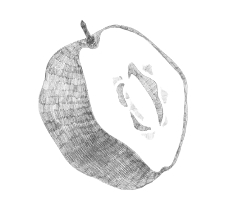Guava

- The exotic fruit guava has a pleasant aroma that is reminiscent of the fresh smell of lemon peel, and the fruit is fragrant even in its whole form. If you bring guava into a room, the strong and pleasant aroma of this fruit will drown out even the smell of tobacco.
- Since there are many species of guava, the fruits of these plants differ primarily in appearance. Their color varies from yellow and green to maroon.
- Guava fruits differ in peel and flavor. Some species may have a thick and bitter rind, while others may be thin and sweet, and the flesh of the fruit can be either sweet or sour.
- Guava is mainly used to make juices, jams and jellies, ice cream and marmalade. The fruit is also popular in the preparation of alcoholic beverages. Red-colored guava, for example, is often used instead of tomatoes in sauces.
- Depending on the variety, guava may contain more vitamin C than oranges, but the fruit does not have a sour taste.
- Useful properties of guava are very diverse. The fruit improves digestion, especially if eaten with peel and seeds, has a beneficial effect on the lymphatic system, improves immunity, helps with intestinal infections.
- Guava is very rich in manganese, the deficiency of which leads to metabolic disorders. It is noteworthy that this fruit is useful for people at any age, including useful for pregnant women, as it contains a large amount of folic acid.